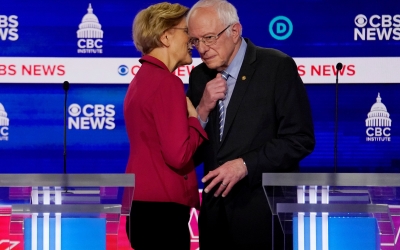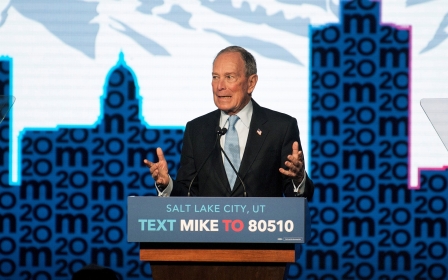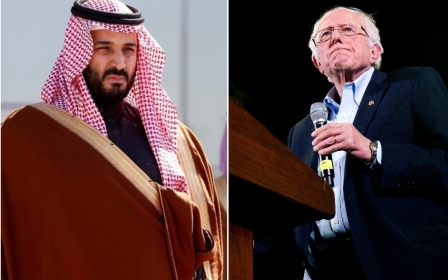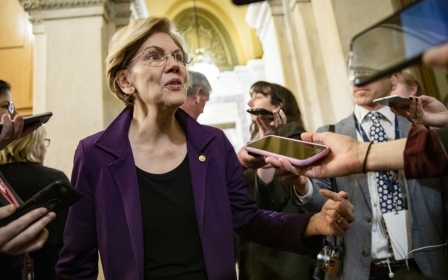AIPAC conference: Who's going, who's not?

If we were to judge AIPAC's influence by the list of speakers attending its Washington conference that opens this weekend, the result would be something of a mixed bag.
Most presidential candidates will not be attending the event - with a few sending video messages addressing the attendees. Democratic frontrunner Bernie Sanders made it clear he is skipping the conference for political reasons, accusing AIPAC of providing a platform for "bigotry".
Sanders had joined fellow left-wing Senator Elizabeth Warren, who was the first to rule out speaking at AIPAC.
Even Senator Amy Klobuchar, a staunch supporter of Israel, opted to send a video message addressing the event instead of showing up in person. The same goes for former Vice President Joe Biden.
Pete Buttigeig initially said he will not attend the conference, but AIPAC confirmed late on Saturday - less than 12 hours before the kick off of the event - that the ex-mayor of South Bend, Indiana, will also address the pro-Israel group with a video message.
New MEE newsletter: Jerusalem Dispatch
Sign up to get the latest insights and analysis on Israel-Palestine, alongside Turkey Unpacked and other MEE newsletters
The sole presidential candidate addressing the conference in person will be New York City's ex-mayor Mike Bloomberg.
IfNotNow, a Jewish-American advocacy group for Palestinian human rights that has been urging presidential candidates to boycott the conference, welcomed the news that Klobuchar and Buttigeig were skipping the event.
"This is a watershed moment and a major victory against the bigotry that AIPAC has legitimised for decades," Dani Moscovitch, the advocacy group's co-founder, said in a statement on Wednesday.
"Even moderates in the Democratic Party are now refusing to attend a conference by a right-wing lobby that allies with bigots just to shield the Israeli government from any consequences for denying the Palestinian people freedom and dignity."
JVP Action, the political advocacy arm of the Jewish Voice for Peace, said that AIPAC's power is "waning".
MoveOn, a progressive group, also called on all candidates to "promote peace and diplomacy" by refusing to attend AIPAC, which the group said "opposed the Iran deal and gives a platform to Islamophobes".
For his part, the Intercept's Glenn Greenwald said AIPAC is becoming a "fringe" group.
"AIPAC is now officially a fringe, right-wing, radioactive rogue organisation," he wrote on Twitter on Wednesday.
"It always was that, but its mask has finally fallen and it's now widely recognized as such. Only Bloomberg so far is willing to be near it (I'll be surprised if Biden doesn't join him)."
Strong Democratic support from Congress
If presidential candidates' attendance were the sole metric for AIPAC's support within the Democratic Party, then Greenwald's assessment would be accurate.
But there is more to the picture.
Despite recently smearing some Democratic Congress members as "more sinister" than the Islamic State (IS) group, AIPAC has managed to flex its congressional muscle by featuring some top Democratic lawmakers on its list of speakers.
They include Senate Minority Leader Chuck Schumer; Steny Hoyer, the number two legislator in the House of Representatives; Democratic Caucus Chair Hakeem Jeffries; Bob Menendez, ranking member on the Senate Foreign Relations Committee; Eliot Engel, chair of the House Foreign Affairs Committee, and Nita Lowey, chair of the House Committee on Appropriations.
'Even moderates in the Democratic Party are now refusing to attend a conference by a right-wing lobby that allies with bigots'
- Dani Moscovitch, IfNotNow
Former presidential candidate and senator, Cory Booker, will also be speaking at the conference, rounding off a list of about two dozen Democrats in Congress.
AIPAC also secured attendance by some Democrats from the same states whose House members it targeted with ads likening Israel critics to militant groups and accusing them of antisemitism.
The posts, which have since been taken down, featured photos of Rashida Tlaib of Michigan as well as Ilhan Omar and Betty McCollum of Minnesota.
Three of Tlaib's colleagues from the Michigan Democratic delegation will be in attendance, including freshman House members Elissa Slotkin and Haley Stevens. From Minnesota, Representative Angie Craig will also be speaking.
Notably, House Speaker Nancy Pelosi, who spoke at last year's conference has yet to confirm her attendance.
Morriah Kaplan, a spokeswoman for IfNotNow, said while top Democratic legislators will be attending AIPAC, the stances of presidential candidates are indicative of an ongoing shift amongst Democrats.
"The candidates and the positions they are taking are emblematic of where the party is moving and the progressive realignment that's happening within the party," she told MEE.
Top Republicans will be there
On the Republican side, Democratic scepticism of AIPAC has been countered by eagerness to show support for the pro-Israel group.
President Donald Trump has been trying to paint his political opponents as hostile to Israel in an effort to court Jewish voters, who have traditionally favoured the Democratic Party. Those efforts often fell into antisemitic tropes and assumptions that all Jews unconditionally supported Israel.
"In my opinion, you vote for a Democrat, you're being very disloyal to Jewish people, and you're being very disloyal to Israel," Trump said last August, sparking a backlash as the comment was widely seen as an antisemitic charge of dual loyalty against Jewish Americans.
But the strategy to squeeze divided Democrats on support for Israel was on full display at the AIPAC conference in 2019.
Omar had faced a storm of condemnation over remarks that were perceived as antisemitic, addressing the role of money in garnering support for Israel. (The congresswoman says she denounces all forms of bigotry).
Still, she featured heavily in the speeches of many Republicans, especially after House Speaker Nancy Pelosi refused to bring forward a resolution denouncing Omar by name.
"The party that has been the home of so many American Jews for so long today struggled to muster the votes to unequivocally condemn antisemitism in a resolution," Vice President Mike Pence said at the AIPAC conference in 2019.
Pence will be at AIPAC again. So will Secretary of State Mike Pompeo, Senate Majority Leader Mitch McConnell and House Minority Leader Kevin McCarthy.
Wedge issue
If last year Republicans used Omar's comments as a wedge issue between Democrats, this year they may go for the anti-AIPAC statement of the candidate who may lead the Democratic ticket in November.
"The Israeli people have the right to live in peace and security. So do the Palestinian people," Sanders said last week.
"I remain concerned about the platform AIPAC provides for leaders who express bigotry and oppose basic Palestinian rights. For that reason, I will not attend their conference."
Republican Congressman Lee Zeldin was quick to denounce Sanders' remarks.
"This is as gross a take as it is inaccurate. Israel is our nation's greatest ally; a beacon of freedom, liberty, hope & prosperity," Zeldin wrote on Twitter.
He added that AIPAC is filled with "amazing" people who are "determined to strengthen and secure the US-Israel alliance".
Other members of Congress joined in criticising Sanders.
"The recent comments by Senator Bernie Sanders on AIPAC are indicative of his far-left ideology," said Congressman Barry Loudermilk, a Georgia Republican.
"Israel has been one of our closest allies, and AIPAC is a big reason for the strength of our bond."
Even some Democrats trying to distance themselves from Sanders and the progressive wing of the party criticised the senator.
Bloomberg went as far as saying that Sanders - who is Jewish - offended not only Israel but also Jews in general when he rebuked AIPAC.
"To characterise AIPAC as a racist platform is offensive, divisive, and dangerous to Israel - America's most important ally in the Middle East - and to Jews," the former mayor said on Tuesday.
"How can Bernie profess he's the path to unity when he's already managed to polarise a people and a party?"
Kaplan slammed Bloomberg's remarks saying that she - as a Jewish-American activist - is personally offended by what ex-mayor said.
"It is absurd, dangerous flattening of the Jewish identity to say that supporting AIPAC is the only way to be Jewish or supporting Israel unconditionally is the only way to be Jewish."
Middle East Eye delivers independent and unrivalled coverage and analysis of the Middle East, North Africa and beyond. To learn more about republishing this content and the associated fees, please fill out this form. More about MEE can be found here.






